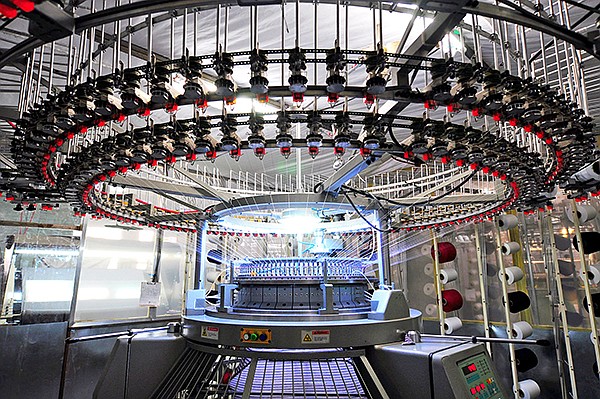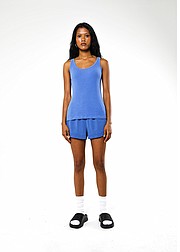MANUFACTURING
Asher Fabric Concepts Announces Creation of New Division
Photo Gallery
Asher Fabric Concepts Announces Creation of New Division
Asher Fabric Concepts has announced the launch of its new division focused on premium wholesale blanks. Called Asher LA, it aims to help reduce the amount of textile waste created in the fashion and textile industries by using the waste from fabric production to create new products. | Photos courtesy of Asher Fabric Concepts
Asher Fabric Concepts has announced the launch of Asher LA, a new division that offers wholesale elevated blanks.
Founded in 1991, the Los Angeles–based company offers high-quality “Made in the U.S.A.” knits for the better contemporary, swimwear and activewear markets in addition to a variety of made-to-order textiles in different fabrications, colors and prints.
“Asher LA is fully vertical. We are knitting for ourselves in Vernon, Calif., and have over 40 of our own knitting machines, mainly Italian- and Japanese-made machines including Santoni and Fukuhara,” said Yael Ohana, president of Asher Fabric Concepts and Asher LA. “Our cut-and-sew facility is fully state-of-the-art and includes the TUKA INA intelligent conveyer hanger system, TUKAcut automatic fabric laser-cutter machine, Tukatech P4 automatic ‘tensionless’ spreader, a digital printer and an embroidery machine all in-house. The members of the Asher LA production team are all paid fair wages and offered benefits.”
The company aims to do its part to reduce waste in the fashion and textile industries. In addition to using a number of eco-friendly raw materials such as organic and recycled cottons as well as recycled polyester, the company reuses the waste from fabric production to create the products for Asher LA. The company also encourages customers to repurpose and reuse its dead-stock fabrics in an additional effort to reduce the amount of waste created.
As sustainable fashion continues to trend toward the mainstream, many consumers are increasingly becoming aware of the effects the fashion industry has on the environment. Much of the clothing waste created comes from manufacturers, with 13 million tons of textile waste being produced each year. The push for a more sustainable and circular fashion industry has focused on keeping clothes out of landfills by creating apparel from more-sustainable materials so that they can be recycled and used again.
Los Angeles has previously set a goal to send zero waste to landfills by 2050, and the Los Angeles Department of Sanitation has recommended banning the disposal of textiles in addition to phasing out single-use plastics. The city is also involved in a program created by the California Product Stewardship Council that brought four publicly funded textile projects focused on repair and reuse to four jurisdictions in the state—Los Angeles City, Los Angeles County, San Francisco County and Alameda County.
The global recycled-textile market is projected to grow to $10.37 billion by 2028, with technological innovations in the textile industry driving the market’s growth. Technologies used in various processes such as sorting and decontaminating are increasing, and many vendors are integrating technologies in the equipment used for textile recycling. Growth can also be attributed to the growing awareness of the harmful impact of textile waste on the environment.
“We are using excess premium fabrics either from over-production and/or limited or discontinued yarns to create blanks. We then launder, cut and dye the garments and ultimately garment-dye, wash and enzyme them,” said Ohana. “During the recent pandemic, Asher decided to takethese excess materials and manufacture them into masks, which then gave Asher the inspiration into the next phase of Asher fabrics, Asher LA, essentially repurposing first-quality inventory into limited-edition capsules. We are hoping to make a small dent in the amount of waste that goes into landfills and in the energy required to make new fabrics.”
Asher LA offers the option to purchase products available in-stock as well as order from the various custom options the brand offers. The sustainable-blanks line features over 30 unisex and women’s bodies including short- and long-sleeved T-shirts, cropped T-shirts, sweatshirts and hoodies, and tanks and joggers.
“We are carrying stock inventory in PFD [Prepare for Dye] as well as our three core colors: vintage black—a pigment-washed black with highs and lows, sugar—our signature vintage white, and our vintage cobalt. We are also offering our customers the option of their own custom colors across all styles,” Ohana added.























